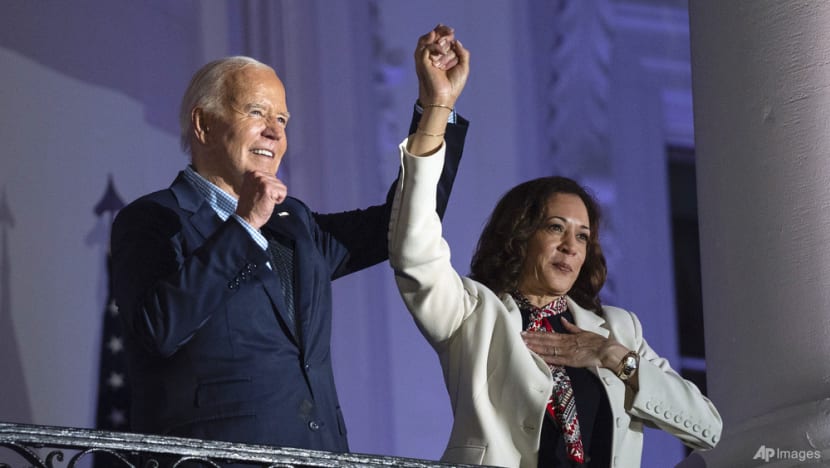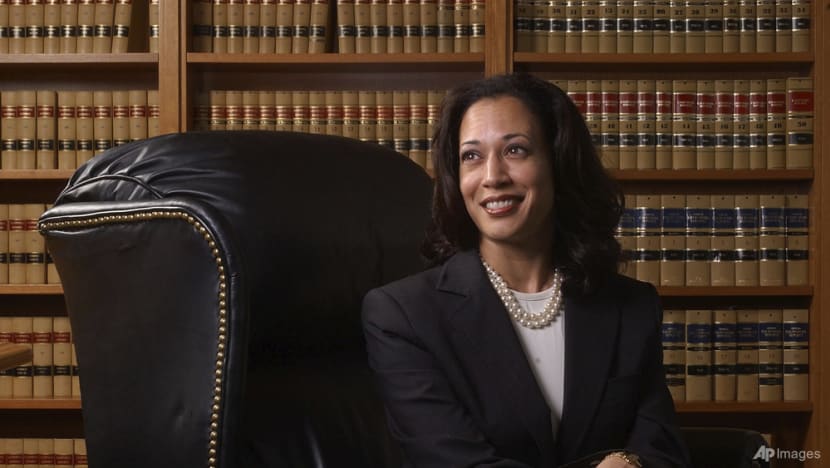Snap Insight: With Joe Biden endorsing Kamala Harris, US presidential election is back to being too close to call
Even though US Vice President Kamala Harris has President Joe Biden’s endorsement, there will still be a full-out sprint to determine if she will be the Democratic nominee, says US politics expert Steven R Okun.


This audio is generated by an AI tool.
SINGAPORE: Putting country over self, US President Joe Biden’s withdrawal from the presidential campaign was met first with relief by the Democratic Party, followed by hope that the Democratic Party’s new nominee can beat Donald Trump in November.
President Biden bowed to the inevitable, amid calls from influential Democratic leaders that he puts the country at risk by not stepping down. A significant number of donors refused to fund his campaign.
Poll numbers and election projections showed that he more than likely could not win, while comparative polls showed that other candidates, primarily Vice President Harris, can.
Mr Biden may have also recognised that he was not up for another four years for the world’s most stressful job.
RACE TO THE DEMOCRATIC NATIONAL CONVENTION
While Ms Harris has Mr Biden’s endorsement, there will be a full-out sprint to determine if she will be the Democratic nominee.
Mr Biden cannot simply transfer the nomination to Ms Harris. Now that he has dropped out of the race, the 3,937 Democratic delegates selected for the convention are essentially free agents.
While uncommitted now, these delegates came to the dance with Mr Biden, and one expects a vast majority will shift to Ms Harris, especially following Mr Biden’s endorsement.
Ms Harris enters the race as the front-runner for the nomination. It's hard to imagine the Democrats passing over her given her position and support across key Democratic constituencies. In addition, it will be easiest to transfer the funds raised by the Biden-Harris ticket to Ms Harris and her running mate, from a campaign finance perspective.
But we do not know yet if others will just hand it to her. The Democrats have a strong bench of potential contenders. Some might see themselves as the best candidate and have yet to endorse the Vice President, including Illinois Governor JB Pritzker.

Never have we been in this situation. We enter one of the most turbulent months in the modern history of US presidential campaigns, a race to the Aug 19 start of the Democratic National Convention in Chicago.
Even if the Party coalesces around her and Ms Harris enters the convention as the presumptive nominee, excitement will be generated by speculation of her choice of running mate. Pennsylvania Governor Josh Shapiro and Arizona Senator Mark Kelly are considered the two most likely to be chosen by her.
“We might just have the most exciting convention in a generation - one that the television networks actually cover live throughout the week,” former White House Press Secretary and 1988 Democratic National Convention spokesperson Mike McCurry, told me.
REPUBLICANS RECONSIDER THEIR STRATEGY
While the Democrats scramble, the Republicans retool. They no longer have a historically unpopular incumbent against to run and for which most of the country did not believe could competently fulfill a second term.
“For almost four years now, the Republican and Rupert Murdoch attack machines have been going hard after Biden on his age and on his family. It has worked since the Democrats have had absolutely no counter strategy. Fox News has been hyping an America in decline, which at least half the country has bought into," Democratic operative and campaign veteran Peter Goelz explained to me.
“Now, the field is reset,” he added.
A few Republicans have accused the Democrats of planning a “coup” and called for President Biden to resign immediately after he dropped out from the presidential race - none of which will likely impact the race in November.
Though Trump and the Republican Party will be dissing “Cackling Copilot Kamala Harris”, few of America’s persuadable voters will be paying attention to them. All eyes will be on the Democratic campaign.
The Republicans may not see the polling bounce that typically goes to a party post-convention. Donald Trump’s historically long and meandering acceptance speech and the parade of white men on the podium leading up to it probably did not help achieve it.
Trump compellingly told his assassination story to open the speech. But the other 75 minutes will not bring to his side the Republicans who do not support Trump or independent women voters he needs to win the election.
BIDEN COMES OUT ON TOP
It has been less than one month since Mr Biden gave one of the worst performances - if not the absolute worst - at a presidential debate in history. Had he stayed in the race and lost, he would have been blamed for handing Trump a second term. Now, he goes down in the books as a great president, at least as far as his party is concerned.
Mr Biden seems to come out on top, no matter what. If the new team wins, he gets credit for helping to defeat Trump again. If the new team loses, he can retain the belief he would’ve done better.
With Mr Biden saying farewell, leaving the Democratic convention open at least to some degree, it will be a wild month ahead.
If we have learned anything at all, it is that the only predictable thing in US presidential campaigns is that something unexpected will happen.
Today, we don’t know something as simple as where the Democratic campaign headquarters will be. It likely will not remain in Wilmington, Delaware, without Mr Biden running for re-election.
Does it move to Washington, DC? The nominee’s home state? Maybe the one of the vice presidential nominee especially if that person hails from one of the must-win Blue Wall states of Pennsylvania, Michigan or Wisconsin, or a swing state like Arizona.
If we can’t even know that, we certainly don’t know who will win come November.
Mr Biden’s dropping out changes everything, at least for now. Do not listen to anyone predicting this race other than being too close to call. They do not understand the 2024 version of US politics.
Steven R Okun is CEO of Singapore-headquartered APAC Advisors and Senior Adviser to geostrategic consultancy McLarty Associates. He is a veteran of multiple US presidential campaigns and served in the Clinton administration as Deputy General Counsel at the US Department of Transportation.


















